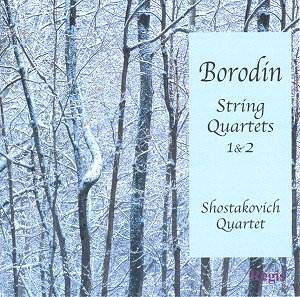Alexander BORODIN
String Quartets 1 &
2
 The Shostakovich
Quartet
The Shostakovich
Quartet
 Regis RRC 1011 [64.38]
Regis RRC 1011 [64.38]
Priced around £6 from retailers

How can one not fail to love the music of Borodin! In these days of extreme
competition in the city office environment, it is salutary to learn that
research professor Borodin, too, had to fight all those academic battles
that were part and parcel of daily life in the medical department of the
St. Petersburg Academy. Yet after work he would return home to compose such
extraordinary scores as Prince Igor, the three Symphonies,
In the Steppes of Central Asia and these two String Quartets.
Apparently no couch potato, he chose instead to burn the midnight oil and
pour his passions into the creation of gloriously emotive and colourful music.
No other part-time composer has enriched the string quartet repertoire as
much as Alexander Borodin. His first quartet (1879) clearly pays homage to
Beethoven and is constructed in a very early neo-classical style. An impressive
work when played by the finest exponents, Borodin's very Russian fingerprints
are always to the surface and, should he have not composed a second quartet,
the first would be greatly admired, if not perhaps deeply loved.
Then, astonishingly, two years later, he composed a second quartet so brilliantly
conceived and melodiously seductive that the future of Russian string quartet
writing was changed forever. His influence, for example, on Shostakovich
is clearly heard in the structures and harmonies of the later composer's
ground-breaking canon.
The First quartet has been recorded a number of times, usually partnered
by the Second. The Shostakovich Quartet give a good performance and almost
succeed in persuading the listener that three of the four movements are not
really a little too long for their subject matter. But the Shostakovich's
commitment is clearly evident throughout. This is a strong performance,
occasionally let down by problems of intonation. The third movement disappoints,
however, due to a particularly choppy and not entirely rhythmic approach
to the spiccato style opening, although the later surprising passages using
harmonics and pizzicati (giving the impression of a child's musical toy)
are well done and clearly carefully rehearsed.
With the Second Quartet however, the Shostakovich Quartet enters into a highly
competitive arena and really fails to do itself justice. As a performance
it is certainly inferior to that of the First Quartet. Borodin dedicated
this work to his wife who on the evidence of this music he must have delighted
in and deeply loved. His own Tartar and Georgian background also came to
the fore, perhaps releasing him into a much heightened level of expression.
The strong oriental flavour of the music requires great subtlety in performance,
an aspect almost entirely missed by the Shostakovich's. Neither the cellist
nor the first violin find the necessary rubato in the first movement to capture
the listener. The music does not feel 'under the skin' of the performers
and the result is a disappointing blandness.
In the second movement a few 'first beat of the bar' nudges pass for what
should be a much more considered approach to the ebb and flow of the musical
argument. The famous 'This is my beloved' (Kismet) slow movement also fails
to impress due to the laid back and distinctly un-subtle approach. And so
it goes on.
Sadly the rather forward and dry sound, although quite well balanced, cannot
have helped the players during the recording. The cellist, in particular,
must have felt frustrated by the brick wall of dead acoustic into which he
was being asked to sing his heart out.
Alternatives? The eponymous Borodin String Quartet recorded both works for
Melodiya and if you can find a second-hand copy of the award-winning EMI
CD (7 47795-2) grab it without a second thought. When comparing the
Shostakovich's CD to the Borodin's one is instantly taken into a quite different
and entrancing world. BMG, inexplicably, does not appear to have released
this classic on CD. A valuable alternative version of both quartets can be
found on a budget priced Arte Nova CD played by the Russian Quartet.
For the Second Quartet alone, the Borodin's earlier Decca recording is also
worth obtaining, although watch out for the mid-price single CD which is
harshly transferred (425 541-2) and go, instead, for the similarly priced
two CD set 'Essential Borodin'
(455
632-2 £11.50) which offers much better value and a better transfer.
Otherwise it's the Takács on Decca (full price) or the Chilingirians
on Classic FM
75605
57027-2 (BMG - mid price £8.50) that would get my vote.
Reviewer
Simon Foster
Performance

Sound


